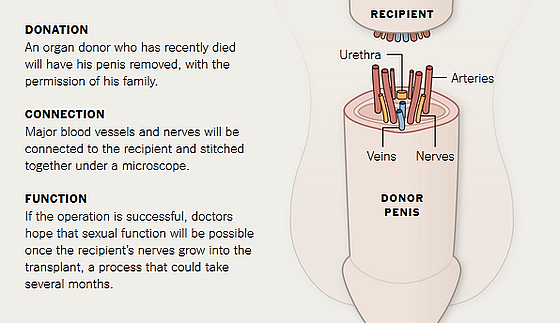"Is it possible to revive the lost male unit by transplant surgery?", The first reproductive organs to be started in the United States

ByRicardo Mestre
Former PrizefighterCase that cut out the male part with gardening scissorsThe doctor is diagnosing it, although the trial of being done is tried, but the local part of the male victim has been lost, "It is difficult to completely reproduce the appearance." Although treatment of male organs lost worldwide is considered difficult, Johns Hopkins University School of Pharmacy will be the first in the United StatesTransplant surgery for male organs"The New York Times has reported that it is preparing for the" New York Times ".
Penis Transplants Being Planned to Help Wounded Troops - The New York Times
http://www.nytimes.com/2015/12/07/health/penis-transplants-being-planned-to-heal-troops-hidden-wounds.html
According to the US Department of Defense, 1367 men in service between 2001 and 2013 are injured in reproductive organs in Iraq or Afghanistan and are recorded in trauma registration. Most of them are men under 35 years old, generally "Instant Explosive Device (IED)Homemade bomb injuries called, some of the injured have partially or entirely lost the penis or testicles (Kagan). While genital damage is said to be difficult to recover, announced that Johns Hopkins University will begin an attempt to reproductive genital transplants that will restore urinary function, sensation, sexual abilities within a few months.

ByAlexandre Dulaunoy
Reproductive organs transplantation surgery has never been found in the United States so far, only two cases have been reported worldwide. One is China's failure example in 2006, the other is a successful example of South Africa in 2014. The organ is planned to be removed from the body of the donor who died from the bereaved family, and it will be a major operation to sew the blood vessel and nerve over 12 hours. It is thought that nerve grows in the penis transplanted at a pace of 1 inch (about 25.4 mm) per month after transplantation, and it is expected that the function lost will be restored in a few months. However, after surgery it is necessary to continue drinking a preventive medicine for transplant rejection reaction, and there is a possibility that the possibility of becoming cancer may increase.
Johns Hopkins University has empowered physician authority to perform 60 transplant surgery experimentally and it may be standard treatment depending on the outcome. Dr. W · P · Andrew · Lee, president of Johns Hopkins University Department of Surgery, said that "It is not possible to fully recover all functions," which shows a realistic view on the patient. On the other hand, Dr. Lee thinks that he can recover the series of functions he desires, "I believe that it is a real goal for me to make a patient's desire to become a child's father a reality." did.

Injured patients have damaged the penis, but there are cases where testicles and testicles remain. In that case, if only the penis is transplanted, the child born will genetically become a child of the patient. In South Africa's success example, young people who lost their penis by circumcision have recovered sexual abilities and the like by transplant surgery and they seem to have become actually fathers. Patients who have lost their testicles can still undergo penile transplant surgery, but as urinary function is restored, sperm is not produced, so it is impossible to have a biological child.
Jeffrey Kern, a bioethicologist at Johns Hopkins University, said, "There is a technology to create a penis from the patient's own tissue, primarily for transgender people, but erection of the penis can be done without transplantation I can not do it. " "The medical team at Johns Hopkins University believes that if the penis could not be repaired or restored, the transplant was considered the best solution." If the transplant does not go well it is possible to resect it, it seems that it is unlikely to become worse than the surgery after resection.

The cost of one surgery is estimated to be 200,000 dollars (about 24 million yen) to 400,000 dollars (about 49 million yen), but with regard to the first operation to be performed within the next few months, Johns Hopkins University will bear the cost. Johns Hopkins University is asking the Department of Defense to assist surgical expenses and the Department of Veterans Affairs of the United States is expected to pay expenses for prophylactic drugs for transplant rejection that are necessary for the lifetime of the operation.
Related Posts:
in Science, Posted by darkhorse_log







